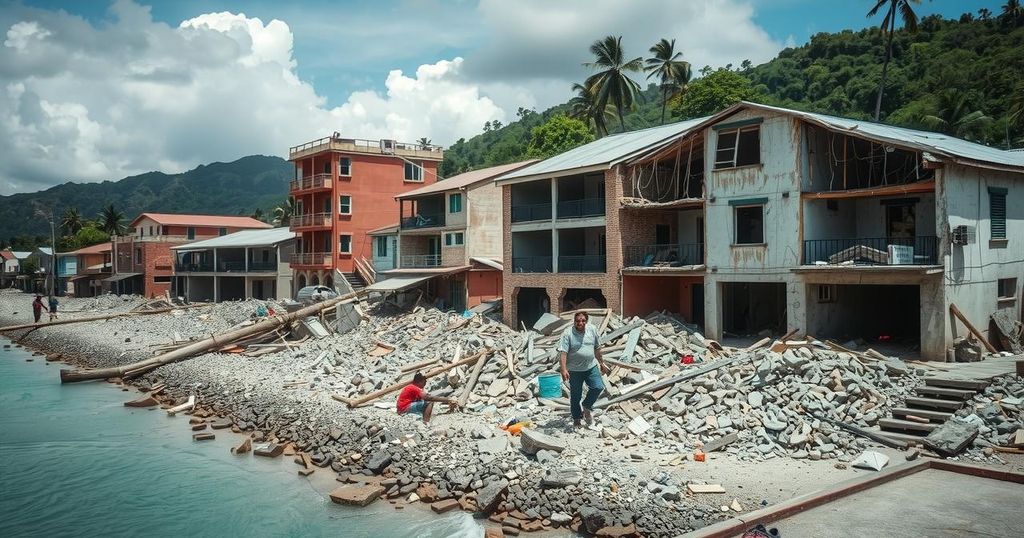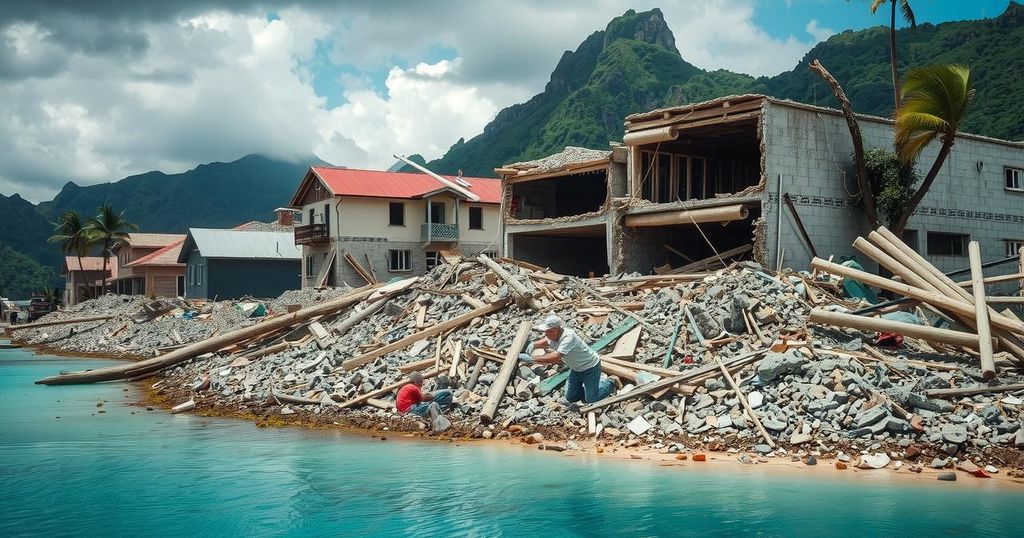Weather
World news
AFRICA, ANALANJIROFO, BEFANDRIANA AVARATRA, BETSIBOKA, BOENY, FORECAST, MADAGASCAR, MAMPIKONY, METEOROLOGY, NATIONAL METEOROLOGICAL SERVICE, NATIONAL OFFICE FOR RISK AND DISASTER MANAGEMENT, NATIONAL RISK ATLAS, NATURAL DISASTERS, RAIN, TEMPERATURE, WEATHER
Maya Ramirez
0 Comments
Madagascar Prepares for Impact of Tropical Cyclone Dikeledi
Tropical Cyclone Dikeledi is set to strike northern Madagascar on January 11, with heavy rain and winds affecting over 45,000 individuals. Emergency preparedness is underway, including the distribution of food and medical supplies, while Mozambique is also taking precautionary actions as the cyclone approaches.
Madagascar is currently bracing for Tropical Cyclone Dikeledi, anticipated to make landfall on January 11, affecting the Vohémar and Antsiranana districts in the northern region. Heavy rains have commenced and are expected to persist until January 13, with up to 170 mm anticipated in the affected areas. Projections indicate that over 45,000 individuals will be directly impacted by the cyclone, prompting humanitarian agencies to enhance their readiness through the provision of emergency supplies and coordination of relief efforts.
As of 10:00 a.m. local time, Cyclone Dikeledi was situated 152 km east of Vohemar, boasting winds of 120 km/h and accelerating towards a landfall. The National Meteorological Service warns of flooding and landslides due to the anticipated heavy rainfall, although forecasts suggest that the rainfall from Dikeledi will be significantly lower than that experienced during Cyclone Gamane in April 2024. The National Risk Atlas and the National Office for Risk and Disaster Management (BNGRC) predict that the cyclone will impact residents across several regions, including Analanjirofo and Diana, which have been placed on red alert for potential threats.
Emergency preparations continue with various sectors activated at both national and local levels. Cash assistance has been dispatched to approximately 9,000 households, and food supplies are being transported by boat to affected communities. Public health resources are being pre-positioned, including medical supplies and hygiene kits, while an emphasis on education continuity has seen temporary classrooms and kits made available in advance of the cyclone’s arrival.
In Mozambique, awareness campaigns regarding Cyclone Dikeledi’s potential impact are underway, with expectations of its reach to the Mozambican channel by January 12. It remains crucial for both nations to coordinate effectively to mitigate the effects of the incoming cyclone, as the road infrastructure in northern Madagascar suffers from previous weather damage, hampering access for relief efforts.
As the situation unfolds, continued vigilance and proactive engagement from humanitarian partners will be essential in responding effectively to the needs of those affected by Tropical Cyclone Dikeledi.
Tropical Cyclones pose significant risks to the island nations of Madagascar and Mozambique, often leading to severe weather phenomena that can cause widespread damage and disruption. The response mechanisms during such emergencies must be robust and well-coordinated, as previous cyclones have revealed vulnerabilities in infrastructure and preparedness. Effective disaster management strategies rely on timely forecasts and the mobilization of resources to support affected populations. The current situation with Tropical Cyclone Dikeledi highlights the ongoing challenges faced by the region in managing these natural disasters and ensuring community safety and resilience.
In summary, Tropical Cyclone Dikeledi is poised to impact northern Madagascar significantly, with heavy rainfall and winds already affecting the region. Humanitarian efforts are activated to provide necessary support to those at risk, with over 45,000 individuals expected to be directly affected. Coordination between emergency response teams and continuous public awareness in both Madagascar and Mozambique will be pivotal in alleviating the potential consequences of this cyclone. As the situation develops, a thorough response will be crucial in ensuring the safety and well-being of the affected communities.
Original Source: reliefweb.int




Post Comment